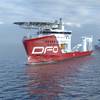A dolphin-watching charter vessel company and several company representatives have incurred fines totaling more than $16,000 after the vessel Dreamweaver became damaged by heavy seas on Auckland Harbour in February 2014, and more than 30 passengers had to be transferred to rescue boats.
Maritime NZ prosecuted the vessel owner and operator, the director of the company providing crew, and the master after the incident which resulted in two passengers being knocked down and one of the vessel’s hulls filling with water.
Dreamweaver Charters Limited was fined $12,750 after admitting a charge under section 65 of the Maritime Transport Act (MTA) that it operated a ship in a manner which caused unnecessary danger or risk to any other person or property by failing to ensure training and safety procedures were implemented.
Kirsty Fiona McPherson, the owner, manager and sole director of Staffing Solutions Limited, which employed the crew onboard Dreamweaver admitted the same charge. She was fined $1,680 for failing to ensure crew received regular training drills and induction training, failure to ensure emergency briefings were conducted, and failing to ensure there was a system in place for monitoring passenger safety.
The skipper of the vessel on the day, Brian John Climo, was also fined $1,680 after admitting a charge under section 64 of the MTA that as the holder of a maritime document he caused unnecessary danger to persons or property by failing to ensure crew were adequately trained in emergency procedures and failing to ensure passengers were clear of the bow prior to turning into rough seas.
At the time of the incident, the vessel was on a dolphin-watching trip approximately 4.5 kilometers southwest of Flat Rock when Climo noticed a severe squall approaching.
After turning the vessel into the weather without warning two passengers standing on the forward deck, the Dreamweaver was hit by about three large waves, resulting in knee-deep water on the deck and the knocking over of two passengers.
The vessel continued traveling toward the Tiritiri Matangi passage for 15 minutes with passengers describing hearing large cracks and bangs as the vessel encountered heavy seas.
When the bilge alarm began sounding and the port bow was low in the water, Climo instructed a crew member to inspect the hull and was advised that it was full of water.
Climo issued a Mayday call to the Auckland Maritime Radio and ordered a crewman to activate the bilge pumps. However, the crewman was unfamiliar with the systems on board and he could not open the two pickup bilge cocks, which would have allowed the bilge pump to be activated from the bridge.
Climo ordered life jackets to be distributed to passengers who were told to gather on the starboard deck in an attempt to counter the listing port bow.
Climo navigated the vessel to the shoreline of the eastern end of the Whangaparaoa Peninsula and with rescue vessels in attendance was able to reach sheltered waters. Passengers were then transported to Coastguard and other rescue vessels. The water on the vessel was pumped out by the Coastguard.
Maritime NZ Director Keith Manch said it was essential that commercial maritime operators ensure crew were appropriately trained and able to handle emergency situations.
“This is particularly important when passengers are involved,” he said. “Paying passengers must be supported by crew who are well trained in safety procedures and equipment. That was clearly not the case in this incident.”












